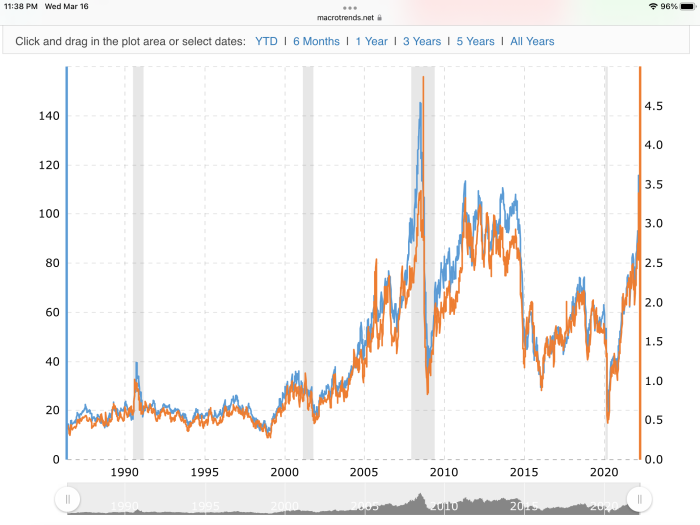Inflation Scaremongering
Steve said:
While the EIA publishes gas prices weekly, others do it daily. If you check those numbers, I'd be willing to bet that gas prices rise with oil but delay dropping with oil by about 3-5 days at minimum.
“This interactive chart compares the daily price performance of West Texas Intermediate (WTI) or Nymex Crude Oil vs regular gasoline prices, U.S. Gulf Coast over the last 10 years.” (It was Macrotrends, not “Megatrends,” and the gas axis of Gulf Coast prices is lower than I would have imagined. Also, someone could always object that the Gulf Coast would be quicker to react. But I did see other, older daily charts — same pattern. I’m open to contrary evidence.)
DaveSchmidt said:
drummerboy said:
where? And if so, why didn't you post something newer than 6 years old?
The resolution from the copy of the St. Louis Fed chart I found, through 2020, was poor. A similar chart, from Megatrends, had the gas price axis labeled in a way that didn’t pass my fact-checking muster.
Don’t let this and the E.U. pandemic funding throw you. You’re still the man to lecture nan about not letting evidence get in the way.
You really think your EU post was dispositive in some way? I thought the fault was kind of obvious so I didn't respond.
The EU is not a single economic unit - it's still made up of individual countries who decide on spending on their own.
You're measuring wrong.
Break it down by country and we'll have something to talk about. (I know you like the work. Have fun.)
And may I say a big FU to imply that I don't respond to evidence.
That offends.
and btw, to take a counterfactual, taking your EU post at face value, inflation in EU countries should be running ahead of US inflation, right?
But it's not.
My earlier assertion may or may not have been correct and was probably too broad (I should have focused on individual countries myself), but I'm not sure what you added to the conversation.
drummerboy said:
The EU is not a single economic unit - it's still made up of individual countries who decide on spending on their own.
$2 trillion in E.U. pandemic relief is to 27 member nations as $5 trillion in U.S. federal pandemic relief is to 50 states. Isn’t it?
Offended? Pffft.
and btw, to take a counterfactual, taking your EU post at face value, inflation in EU countries should be running ahead of US inflation, right?
No. Why would it? As noted, E.U. aid was a smaller proportion of GDP than the U.S. aid was.
DaveSchmidt said:
drummerboy said:
The EU is not a single economic unit - it's still made up of individual countries who decide on spending on their own.
$2 trillion in E.U. pandemic relief is to 27 member nations as $5 trillion in U.S. federal pandemic relief is to 50 states. Isn’t it?
of course not. They're independent countries in the EU. In order to really do the calculation as it pertains to inflation, you have to know how much each country spent, what their GDP is, and what the inflation rate is.
U.S. States don't equate to EU countries.
e.g.
https://cepr.net/as-the-fed-prepares-to-raise-rates-the-inflation-hawks-are-running-wild/
The point that many of us keep making is that most of the inflation we have seen over the last year was due to the reopening from the pandemic, not the stimulus package. A simple picture makes this point well. Inflation jumped pretty much everywhere across the OECD.
The rise in the United States was somewhat higher than average, but not hugely so. And countries like Spain and Belgium, which did not have huge stimulus packages, actually have higher rates of inflation.
drummerboy said:
of course not. They're independent countries in the EU. In order to really do the calculation as it pertains to inflation, you have to know how much each country spent, what their GDP is, and what the inflation rate is.
Why do all that when the only comment I was debunking was “I think you'll find that Europe's welfare states already had mechanisms to deal with the pandemic, whereas the U.S. had to come up with new spending”?
drummerboy said:
My earlier assertion may or may not have been correct and was probably too broad (I should have focused on individual countries myself), but I'm not sure what you added to the conversation.
Now that’s taking evidence like a champ.
Steve said:
If you check those numbers, I'd be willing to bet that gas prices rise with oil but delay dropping with oil by about 3-5 days at minimum.
Even better than a bet: a Borenstein, head of the Energy Institute at Cal.
… We shouldn’t expect gasoline prices to drop as quickly as they’ve risen, said Severin Borenstein, a professor at the University of California, Berkeley. “It’s known as the rockets-and-feather effect. They go up like rockets and come down like feathers.”
That’s because people tend to pay more attention when oil prices are rising, Borenstein said. And when those prices go down? “People just breathe a sigh of relief. They continue to go to their station they’ve been going to, they don’t shop around very much — that lowers the competitive pressure,” he said.
https://www.marketplace.org/2022/03/07/how-rising-oil-prices-make-gasoline-more-expensive/
DaveSchmidt said:
Steve said:
While the EIA publishes gas prices weekly, others do it daily. If you check those numbers, I'd be willing to bet that gas prices rise with oil but delay dropping with oil by about 3-5 days at minimum.
“This interactive chart compares the daily price performance of West Texas Intermediate (WTI) or Nymex Crude Oil vs regular gasoline prices, U.S. Gulf Coast over the last 10 years.” (It was Macrotrends, not “Megatrends,” and the gas axis of Gulf Coast prices is lower than I would have imagined. Also, someone could always object that the Gulf Coast would be quicker to react. But I did see other, older daily charts — same pattern. I’m open to contrary evidence.)
doesn't really tell me much given the x-axis.
DaveSchmidt said:
Even better than a bet: a Borenstein, head of the Energy Institute at Cal.
… We shouldn’t expect gasoline prices to drop as quickly as they’ve risen, said Severin Borenstein, a professor at the University of California, Berkeley. “It’s known as the rockets-and-feather effect. They go up like rockets and come down like feathers.”
That’s because people tend to pay more attention when oil prices are rising, Borenstein said. And when those prices go down? “People just breathe a sigh of relief. They continue to go to their station they’ve been going to, they don’t shop around very much — that lowers the competitive pressure,” he said.
https://www.marketplace.org/2022/03/07/how-rising-oil-prices-make-gasoline-more-expensive/
Then why have we not seen relief at the pump when oil is down by about 1/3? Please explain that? It's not that I'm not paying attention.
Steve said:
Then why have we not seen relief at the pump when oil is down by about 1/3? Please explain that? It's not that I'm not paying attention.
Borenstein explained it, I thought. We’re all in violent agreement now.
ETA: You may be a consumer attention outlier. If you have a different explanation for this particular lag in prices at the pump, share away.
DaveSchmidt said:
Borenstein explained it, I thought. We’re all in violent agreement now.
ETA: You may be a consumer attention outlier. If you have a different explanation for this particular lag in prices at the pump, share away.
Corporate greed? Anti-trust violations and monopolistic tendencies?
ETA: I must have misread/misunderstood your posts as I thought that you were contending that they moved in tandem. If I did that, my apologies.
Steve said:
ETA: I must have misread/misunderstood your posts as I thought that you were contending that they moved in tandem. If I did that, my apologies.
I found charts and a Forbes article that suggested the prices moved equitably. You elaborated on the point of a lag but phrased it as a belief; one of the charts left me questioning it, but further googling and the Cal expert confirmed a typical lag.
drummerboy said:
DaveSchmidt said:
(More recent charts continuing the pattern can be found online.)
where? And if so, why didn't you post something newer than 6 years old?
https://www.macrotrends.net/2501/crude-oil-vs-gasoline-prices-chart
cramer said:
https://www.macrotrends.net/2501/crude-oil-vs-gasoline-prices-chart
That’s the one I posted in reply to Steve.
An interesting point just made on CNBC. The gasoline station owners only operate on very small margins. It's the credit card companies that really make out with high gasoline prices. 2 1/2 % of $4 is a lot more than 2 1/2% of $2.50 or $3.
"Generally, the markup (or “margin”) on a gallon of gas is about 15 cents per gallon (gross profit before expenses). Factoring in expenses, which include rent, utilities, freight, labor and credit card fees, a retailer is left with about 2 cents per gallon in profit."
https://www.omegawv.com/faq/140-how-much-money-do-businesses-make-on-fuel-purchases.html#:~:text=Retailers%20Make%20Very%20Little%20Selling,cents%20per%20gallon%20in%20profit.
cramer said:
"Generally, the markup (or “margin”) on a gallon of gas is about 15 cents per gallon (gross profit before expenses). Factoring in expenses, which include rent, utilities, freight, labor and credit card fees, a retailer is left with about 2 cents per gallon in profit."
https://www.omegawv.com/faq/140-how-much-money-do-businesses-make-on-fuel-purchases.html#:~:text=Retailers%20Make%20Very%20Little%20Selling,cents%20per%20gallon%20in%20profit.
Hence you'll rarely find a gas station not attached to a convenience store or the like. That's where the money is.
is the chart accurate or not?
Biden calls out companies for high gasoline prices. https://t.co/kti1sUOXuP
— Jennifer Jacobs (@JenniferJJacobs) March 16, 2022
That’s what I was asking. It’s looking like price gouging to me. Not inflation.
An explanation of why gasoline station operators are not so quick to lower prices when crude oil prices go down.
btw - Crude oil prices were up 8% today, to $102 for WTI and $106 for Brent crude, on supply concerns raised by the IEA. It's really been a lack of supply, even before the Ukraine invasion.
But they are very quick to raise prices on fuel that is already sitting in their tanks. Also, it's still down about 20% from its recent high yet pump prices are down much less.
Steve said:
But they are very quick to raise prices on fuel that is already sitting in their tanks. Also, it's still down about 20% from its recent high yet pump prices are down much less.
of course they will charge whatever the public will bear. When people get tired of the high price and cut down on discretionary driving and demand falls a bit, so will prices.
One would think competition would among providers would make a difference but it doesn’t seem to.
Steve said:
One would think competition would among providers would make a difference but it doesn’t seem to.
they all go to linden’s refinery for gasoline.
Jaytee said:
they all go to linden’s refinery for gasoline.
I know that. That’s the monopoly but the stations themselves should be competing with one another.
Steve said:
I know that. That’s the monopoly but the stations themselves should be competing with one another.
I think that in general, people are creatures of habit when it comes to buying gas. They check prices among the convenient locations when they first get to an area, settle on a good price/convenience/quality combination, and then generally stick to that station. Relative prices among stations seem to rise and fall in relation to each other.
I go to the BP at the Vauxhall/Springfield corner. I like paying by card and their card price is better than most (same as cash) and the gas is good quality.
jimmurphy said:
the gas is good quality.
How do you know the gas is good quality? I always assume gas is the same everywhere, and the name brands can charge more just because they're name brands. I don't seek out discount / no-name places, but I end up at those places sometimes, and I've never had a problem afterwards.


















While the EIA publishes gas prices weekly, others do it daily. If you check those numbers, I'd be willing to bet that gas prices rise with oil but delay dropping with oil by about 3-5 days at minimum.